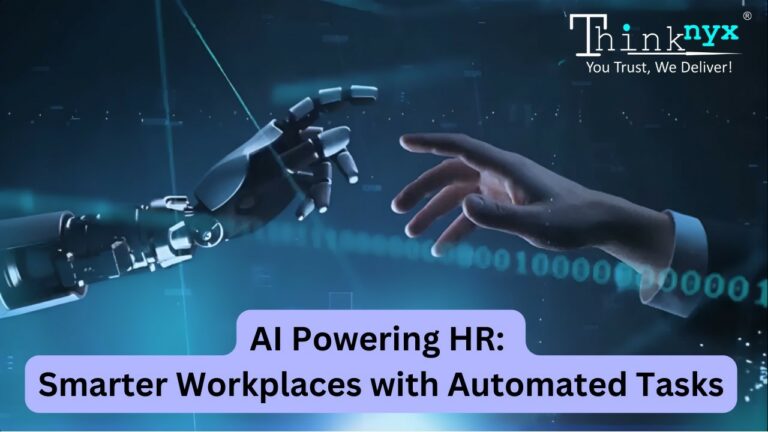AI Powering HR: Smarter Workplaces with Automated Tasks

The way HR teams manage people at work is undergoing a rapid transformation, largely driven by the increasing influence of Artificial Intelligence (AI). By combining AI with HR practices, businesses are converting old ways of handling HR Tasks and creating smoother workflows. This means happier employees and a more efficient organization overall. In this blog, we’ll dive into how AI is transforming HR and making the workplace better with smart advancements
Empowering HR Decisions with AI
AI is no longer just a concept; it’s transforming HR departments with a suite of intelligent tools and technologies. These tools free up HR professional’s time and create a more efficient and effective system. Here are several ways in which AI is significantly having a major impact:
• Recruiting Gets a Boost:
- Efficiency in Screening: AI algorithms can quickly scan resumes and applications, identifying candidates with the qualifications and experiences most relevant to the job description.
- Bias Reduction: AI can help reduce unconscious bias and ensure a more equitable selection process by automating the initial stages of the hiring process. HR recruiters may often have unconscious biases, such as favoring candidates based on their ethnicity.
- Initial Interviews: AI-powered chatbots can conduct preliminary interviews to assess candidates’ suitability for the role, freeing up HR professionals’ time for more strategic tasks.
• Onboarding on Autopilot:
- Smooth Onboarding: AI assistants can guide new employees through the onboarding process, from filling out forms to providing company information and resources.
- Immediate Support: New hires can use AI chatbots to ask questions and resolve queries instantly, easing their transition into the new role and organization.
• Learning Made Personal:
- Customized Training: HR can evaluate employees performance data, skills, and learning preferences to tailor personalized training plans using AI.
- Skill Development: By identifying skill gaps, AI helps HR to keep employees current with market trends and internal business demands, encouraging a culture of continuous learning.
• Workplace Safety:
- Hazard Detection and Risk Assessment: AI-powered sensors and monitoring systems can proactively identify potential dangers by analyzing real-time data from the work environment. This includes detecting hazardous conditions, equipment malfunctions, and unsafe behaviors.
- Real-Time Alerts: Timely notifications can be sent to employees and management about identified risks, enabling swift responses to prevent accidents and injuries.
• Employee Well-being
- Well-being Monitoring: AI applications can track employee factors such as stress levels, work-life balance, and overall job satisfaction through various data points.
- Data-Driven Interventions: Insights derived from well-being data can be used to implement targeted programs and initiatives to improve employee mental and physical health, leading to increased job satisfaction and productivity.
The Future of AI in HR
As AI evolves, its importance in human resources will become even more important. From individualized learning experiences to enhanced workforce planning, the possibilities are limitless. However, enterprises must have a human-centric strategy, in which AI enhances rather than replaces human skills. By appropriately leveraging the potential of AI, HR departments can promote positive transformation and create workplaces that flourish in the digital age.
The Takeaway of AI in HR
The incorporation of AI into human resources (HR) operations does not imply the displacement of HR experts but rather acts as a tool to improve their skills. Embracing AI technology allows HR departments to function more efficiently, get strategic insight, and focus more on the requirements of their people. This revolutionary method creates a positive and productive work atmosphere. Finally, the collaboration between AI and HR promises to improve operations, elevate strategic decision-making, and foster a culture that values the well-being and success of all stakeholders.
In Summary
AI is revolutionizing HR by automating tasks, improving efficiency, and enhancing employee experience. By streamlining processes like recruitment, onboarding, and training, AI frees up HR professionals to focus on strategic initiatives. Additionally, AI-driven insights into employee data enable personalized development plans and improved workplace well-being. While AI is a powerful tool, it complements human expertise, not replaces it. The future of HR lies in the effective collaboration between humans and AI to create high-performing and engaged workforces.
By – Nikhil Bhatia